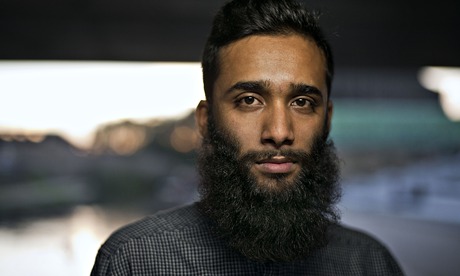
RNA - My beard is about three and a half to four inches long now. I started growing it nearly a year ago; the result of a number of things coming together. One – if I am honest – was laziness. It also began not long after an incident at my university, King’s College London. Archbishop Desmond Tutu was guest of honour at a reception. I went along in traditional dress, thinking: “This is Desmond Tutu. He fought against discrimination and oppression. I can be myself because everyone will be welcoming and open.” Then I was stopped by security and they demanded to know if I had actually been invited. From then I just thought: “Why not?”
Slowly, I became more and more fascinated with having a beard. I can only liken it to the experience of black women who relax their hair and then one day stop relaxing their hair and find it opens up a brand new world to them. There are all these beard products, oils, shampoos, combs. People even blog about them.
Once I grew my beard, there was an immediate effect. Muslims are more open to me; others with beards notice me because they understand what I’m experiencing.
Of course, there is also the other issue that beards are big in mainstream popular culture. People started coming up to me and saying “Great beard”. Within my own community, it gives me a sense of solidarity; outside, there is a feeling of specialness. Some people ask: “Are you growing that for religious reasons or because it is fashionable?” At first, I would feel I had to justify it. I would say it was fashionable and then religious. But then I stopped doing that. If I was a white guy with a ginger beard, no one would ask those questions of me.
My mum is keen that I get rid of it. My dad thinks I should shorten it. Mum worries in the current climate about how people will perceive it. But for me it is quite empowering. I love it when another Muslim sees me and comes and says “Salam” on the street. It is a subculture I am tapping into; a sense of pride in my identity as a Muslim. Beards play a massive role as a key identifier of whether you are a Muslim or not. It gives a sense of community.
As someone who has a bit of a public profile because of the role I play at university, a beard can also help to normalise the presence of a visible Muslim. It helps me to demonstrate to people “If I can do it, you can do it; you can be yourself.” They see a Muslim outwardly practising.
There is an assumption in our communities that if you are in the public sphere, you sell out a little and lose the things that make you who you are. By growing my beard, I debunk that a bit. My face has been everywhere because of freshers week and the fact that so many Muslims have been coming up to me and talking about issues they were facing was really a milestone for me.
I think the benefits of having my beard – not least that it covers up my eczema – outweigh the disadvantages. Some people grow them for religious reasons, others because it is comfortable, others because they are hipsters. Who cares?
The article was originally published on The Guardian.
R111/108/C/